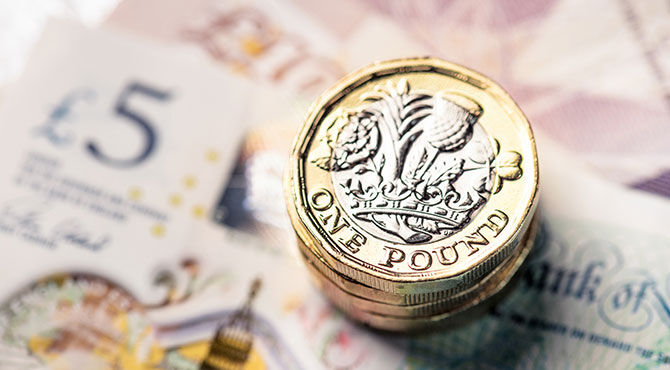Pound buoyed by services sector bounce
The UK’s service sector bounced back in May, leading to a sharp rise in the pound against the dollar and Euro. Commentators suggest GDP growth could recover in the second quarter as a result.

 5 June 2018
5 June 2018UK heading towards GDP growth
The Markit/CIPS services purchasing managers’ index (PMI) showed a reading of 54 last month, up from 52.8 in April in an index where any reading above 50 indicates growth, and well above of market forecasts of a 52.9 return.Publication of the index came on the heels of May’s PMI for manufacturing, which also came in well above economists’ expectations, while the construction PMI showed growth in the sector was steady if unspectacular.“May’s services report increases our conviction that GDP growth will recover in Q2 following weather-related weakness in Q1,” said Samuel Tombs, chief UK economist at Pantheon Macroeconomics.“The weighted average of the manufacturing, construction and services PMIs in Q2 so far is consistent with only a 0.3 per cent quarter-on-quarter rise in GDP. But the PMIs didn’t fully capture the slowdown in Q1, so they probably are understating the subsequent rebound.”Related stories:
- Migration uncertainty hampering UK exporters
- The Brexit factor cutting manufacturing investment
- Businesses fearful of trade war in wake of US tariffs
Chris Williamson, chief business economist at IHS Markit, said the improvement in service sector activity added to evidence that the economy was on course to rebound in the second quarter but, like the manufacturing and construction surveys, raised questions about the outlook.“So far, the three PMI surveys indicate that GDP looks set to rise by 0.3-0.4 per cent in the second quarter,” he said. “However, disappointing inflows of new work suggest that growth could wane in coming months as Brexit-related uncertainty continues to weigh on spending decisions and dampen business confidence.“The signs of economic growth rebounding in the second quarter will likely up the odds of the Bank of England hiking interest rates again in coming months, likely August, but with the forward-looking indicators suggesting that the economy could relapse, a rate rise is by no means assured.”
Optimism tempered by Brexit uncertainty
Ruth Gregory, an economist at Capital Economics, said the PMI suggested that the services sector had shaken off the weakness it was displaying at the start of the year.She added, “What’s more, the forward-looking indicators of the survey were fairly encouraging. The new orders index picked up a little in May and the small rise in the employment index also suggests that firms remain confident enough in the outlook for demand to increase the pace of hiring.”As ever, however, the spectre of Brexit uncertainty hovers over future expectations. Lee Hardman, a currency analyst at MUFG, said, “The scope for the pound to rebound in the near-term is likely to remain capped by unfavourable Brexit developments in the month ahead.“It appears increasingly unlikely that much progress will be made at the upcoming EU leaders’ summit. The votes will be seen as an important test of the government’s ability to pass their Brexit plans later this year. Brexit uncertainty is set to be a weight on the pound this month.”Relocate’s new Global Mobility Toolkit provides free information, practical advice and support for HR, global mobility managers and global teams operating overseas. Access hundreds of global services and suppliers in our Online Directory
Access hundreds of global services and suppliers in our Online Directory
©2025 Re:locate magazine, published by Profile Locations, Spray Hill, Hastings Road, Lamberhurst, Kent TN3 8JB. All rights reserved. This publication (or any part thereof) may not be reproduced in any form without the prior written permission of Profile Locations. Profile Locations accepts no liability for the accuracy of the contents or any opinions expressed herein.






































